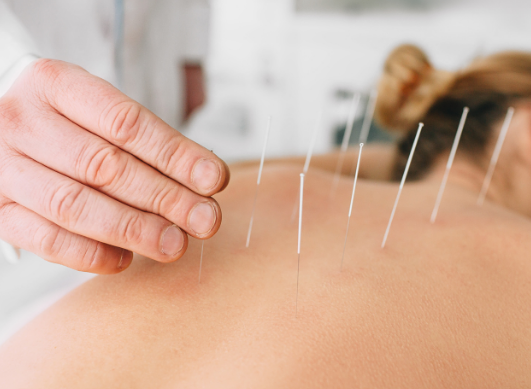Acupuncture: how it works and when to use it
Published Nov 2, 2023 • By Candice Salomé
Originating from traditional Chinese medicine, acupuncture corresponds to the stimulation of specific "points" on various parts of the body, using a number of physical techniques. Therapeutic indications for acupuncture are quite vast, making it one of the main forms of complementary medicine.
So what exactly is acupuncture and how does it work? What are its benefits? What types of conditions can it treat?
We explain it all in our article!

What is acupuncture?
Acupuncture is one of the branches of traditional Chinese medicine. It is thought to have been introduced to Europe in the early 16th century, but was not internationally recognized until the 20th century.
Acupuncture refers to the stimulation of specific points on the body, called "acupuncture points", for therapeutic purposes, using various physical techniques.
In acupuncture, the body is considered to be an "energy plane". The acupuncturist therefore focuses on the circulation of vital energy (known as QI) in the human body. They establish an energetic diagnosis based on several elements:
- The patient's medical history and symptoms,
- Physical examination, which includes several aspects that are specific to acupuncture,
- Taking the pulse in the wrists,
- Examination of the tongue,
- An audio-olfactory examination. The doctor listens to the sounds made by the patient: breathing, voice, borborygms. They also pay attention to body odors.
The acupuncturist then synthesizes this information to determine the treatment that is best suited to the patient.
In acupuncture, an illness or its symptoms are perceived as disturbances in the circulation of the body's energy, as an energy imbalance. The aim of acupuncture is therefore to restore the balance of this circulation.
Acupuncture points are located at specific spots from which it is possible to access the body's circulating energy. There are currently 361 recognised acupuncture points.
Various physical techniques are used in acupuncture to stimulate these points: they depend on the health problems presented by the patient, and can include:
- Stimulation using very fine needles inserted through the skin,
- Moxibustion, which involves stimulating the points using heat,
- Electro-acupuncture, in which needles are connected to an electrical current of variable intensity and frequency, delivered by a medical electro-stimulator,
- Laser-acupuncture, which uses laser radiation to stimulate acupuncture points.
The technique most commonly used is needle stimulation. The needles are left in place for a period ranging from a few to several dozens of minutes.
When to use acupuncture?
There are various therapeutic indications for the use of acupuncture.
Acupuncture for stress management
The relaxed feeling a patient experiences after an acupuncture session can last for hours or even days. In fact, several studies have demonstrated the effects of acupuncture on stress and anxiety.
By unblocking certain points, acupuncture restores balance and thus relieves the effects of stress on the body.
Acupuncture for pain relief
In the case of chronic pain, acupuncture provides relief by:
- Accelerating the healing of inflamed areas,
- Relaxing the patient so that they can take better control of their pain.
Back pain, for example, can be significantly relieved by acupuncture.
Acupuncture for treating insomnia
In Chinese medicine, sleep disorders can be explained by energy imbalances located around various meridians (interconnected channels in the human body through which the QI circulates) such as the heart, the spleen, the kidneys, etc.
The acupuncturist acts on specific points to help the body remain calm and relaxed, and to promote better sleep.
Acupuncture for treating migraines
Acupuncture can reduce the frequency and intensity of migraines. In fact, several studies have shown that when acupuncture is used together with medication, it reinforces the effects of the latter.
Acupuncture for treating addictions
By releasing endorphins and improving stress management, acupuncture is an effective treatment for addictions. It is often used to help people who want to give up smoking.
Acupuncture for strengthening the immune system
Because acupuncture can act on various areas, such as sleep, digestion, stress and pain, it can also help strengthen the immune system in general.
For example, allergy symptoms and susceptibility to seasonal colds are often treated with acupuncture.
Acupuncture for weight loss
By rebalancing your appetite, acupuncture can help you lose weight. By improving certain factors that disrupt the inner balance (stress, anxiety, hormonal imbalances, etc.) and can be responsible for appetite problems, it is possible to regulate hunger. Patients are then able to eat in quantities suitable to their needs.
Was this article helpful to you?
Have you ever tried acupuncture? How did it go?
Share your thoughts and questions with the community in the comments below!
Take care!
1 comment
You will also like

What are the dangers associated with the over-the-counter sale of certain medicines?
Dec 19, 2020 • 6 comments

 Facebook
Facebook Twitter
Twitter


